初中英语学习的60个必备句型
2023初中英语必背句型(精选)

2023初中英语必背句型(精选)2023初中英语必背句型(精选)2023初中英语必背句型有哪些呢?怎么才能学好初中的英语呢?下面小编给大家整理了关于2023初中英语必背句型的内容,欢迎阅读,内容仅供参考!2023初中英语必背句型1.我是学生.(简单句)I’m a student.2.他在做的与我无关.(复合句)What he does is none of my business.3.我来了,但他已经走了. (并列句)I came, but he has left.4.我不知道他已经走了,但是她知道. (并列复合句)I don’t know he has left, but she does.5.你能回答我的问题吗?(疑问句)Can you answer my question?6.我在写信. (陈述句)I’m writing a letter.7.请开门.(祈使句)Please open the door.8.他是一个多聪明的男孩啊!(感叹句)What a clever boy he is!9.我非常喜欢这本书.I like the book very much.10.他昨天去哪儿了?Where did he go yesterday?11.你应该用正确的方法做这件事.You should do it in the right way.12.最终, 他受到了惩罚.At last, he was punished.13.他在湖里游泳.He is swimming in the lake.14.至今,我已经读了100部小说.So far, I have read 100 novels.15.我不喜欢这乐曲.I don’t like the music.16.你喜欢音乐吗?Do you like music?17.如果我是你, 我会跟他在一起.If I were you, I would stay with him.18.面对困难,一定要保持冷静.When facing difficulty, you should keep calm.19.最终,他梦想成真.At last, his dream came true.20.你所说的听起来很有道理.What you says sounds reasonable.初中英语常考句式1. be worth doing值得被……(主动形式表被动含义)The book is well worth reading.这本书很值得被读。
英语最常用的60个句型及例句
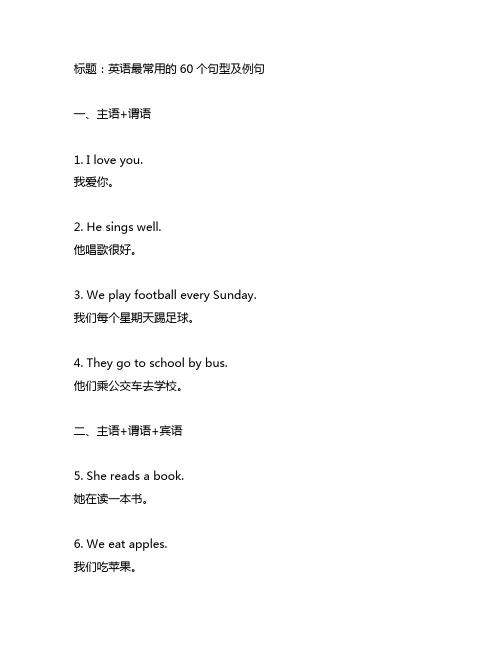
标题:英语最常用的60个句型及例句一、主语+谓语1. I love you.我爱你。
2. He sings well.他唱歌很好。
3. We play football every Sunday. 我们每个星期天踢足球。
4. They go to school by bus.他们乘公交车去学校。
二、主语+谓语+宾语5. She reads a book.她在读一本书。
6. We eat apples.我们吃苹果。
7. He speaks English.他讲英语。
8. They watch TV.他们看电视。
三、主语+谓语+宾语+宾语补足语9. She paints the wall red.她把墙刷成了红色。
10. We call him a hero.我们称他为英雄。
11. He considers the plan unfeasible. 他认为这个计划不可行。
12. They make their father proud.他们让父亲感到自豪。
四、主语+系动词+表语13. I am a teacher.我是一名老师。
14. She was happy.她很快乐。
15. He is my friend.他是我的朋友。
16. They are students.他们是学生。
五、主语+谓语+间宾+直宾17. She teaches us English. 她教我们英语。
18. He bought her a gift. 他给她买了一份礼物。
19. We tell him a story.我们给他讲故事。
20. They show us the way.他们给我们指路。
六、主语+谓语+宾补+宾语21. She made her sister cry.她让她妹妹哭了。
22. They found the problem solved. 他们发现问题已经解决了。
23. He heard the news spread.他听说了消息已经传开了。
初中英语学习的60个必备句型!

初中英语学习的60个必备句型!句型1:There+be +主语+地点状语/时间状语There's a book on the desk.桌上有本书。
句型2:What’s wrong with+sb. / sth. ?What's wrong with you?你怎么了?句型3:How do you like...?How do you like Nanjing?你觉得南京怎么样?句型4:What do you like about...?What do you like about Nanjing?你喜欢南京什么?句型5:had better(not)+动词原形You'd better have a rest.你最好休息一下。
句型6:How+adj. / adv. +主语+谓语! ;What a/an+adj. +n. +主语+谓语!How beautiful the girl is !这个姑娘真漂亮!What an interesting book it is!多有趣的一本书呀!句型7:Thank+sb. +for (doing) sth.Thank you for helping me.感谢你帮我。
句型8:So+be/ 情态动词/ 助动词+主语He is a doctor. So am I.他是一个医生,我也是。
句型9:... not ... until ...He didn't do his homework until his mother came back.直到他的父母回来他才写作业。
句型10:比较级+and+比较级It rained harder and harder.雨越下越大。
句型11:the +比较级,the +比较级The more careful you are ,the fewer mistake you will make.越仔细,越少犯错。
初中英语学习必背的62个句型,句句经典!

句型1:There+be +主语+地点状语/时间状语 There’s a boat in the river. 河里有条船。
句型2:What’s wrong with+sb./sth.? What’s wrong with your watch? 你的手表有什么毛病? 句型3:How do you like...? How do you like China? 你觉得中国怎么样? 句型4:What do you like about...? What do you like about China?你喜欢中国的什么? 句型5:had better(not)+动词原形 You’d better ask that policeman over there. 你最好去问问那边的那个警察。
句型6:How+adj. / adv. +主语+谓语! What a/an+adj. +n. +主语+谓语! How cold it is today ! 今天多冷啊! What a fine picture it is! 多美的一幅图画呀! 句型7:Thank+sb. +for (doing) sth.Thank you for coming to see me. 感谢你来看我。
句型8:So+be/ 情态动词/ 助动词+主语 He is a student. So am I. 他是一个学生,我也是。
句型9:... not ... until ... He didn’t have supper until his parents came back. 直到他的父母回来他才吃饭。
句型10:比较级+and+比较级 The baby cried harder and harder. 那孩子哭得越来越厉害。
句型11:the +比较级,the +比较级 The more one has,the more one wants. 越有越贪。
初高中英语句型大全

初高中英语句型大全1. 基本句型- 主语 + 动词- 主语 + 动词 + 宾语- 主语 + 动词 + 间接宾语 + 直接宾语- 主语 + to be + 表语- 主语 + to be + 形容词- 主语 + to be + 名词- 主语 + to be + 副词- 主语 + to be + 现在分词- 主语 + to be + 过去分词- 主语 + 动词 + 不定式- 主语 + 动词 + 副词- 主语 + can/could/may/might/will/would/should + 动词- 主语 + have/has/had + 过去分词- there + be + 存在物2. 肯定句与否定句- 肯定句:主语 + 动词- 否定句:主语 + do/does/did not + 动词- 否定句(be动词):主语 + am/is/are/not + 表语/形容词/名词/副词/现在分词/过去分词3. 一般疑问句- 一般疑问句:助动词/Be动词 + 主语 + 动词- 特殊疑问句:特殊疑问词 + 一般疑问句- 特殊疑问词:what/when/where/who/why/how4. 祈使句- 祈使句:动词 + 宾语5. 陈述句与疑问句转换- 陈述句变疑问句:陈述句 + 吗?- 特殊疑问句变陈述句:特殊疑问词 + 陈述句6. 感叹句- 感叹句:How + 形容词/副词 + 主语 + 动词!7. 虚拟语气- If从句 + 主语 + 动词(过去式),主句 + would/could/might + 动词(原形)以上是初高中英语常用的句型大全,希望对你有所帮助!。
中考英语必考的60个句型

中考英语必考的60个句型,趁早掌握!1。
as…as 和……一样中间必须用形容词或副词原级。
例如:This classroom is as big as that one.这间教室和那间一样大。
He runs as fast as Tom.他和汤姆跑的一样快。
否定结构:not as/so…as,“不如……"。
上面的两个句子可分别改为:This classroom is not as/so large as that one.这间教室不如那间大。
He doesn’t run as/so fast as Tom。
他跑得不如汤姆快。
2。
as soon as 一……就……用来引导时间状语从句。
若主句是一般将来时,从句要用一般现在时。
例如:I’ll tell him the plan as soon as I see him.我一看到他就告诉他这个计划。
He’ll go home as soon as he finishes his work。
他一完成工作就回家。
3。
be busy/enjoy/hate/go on/finish doing sth。
忙于/喜欢/讨厌/继续/完成做某事在enjoy, finish, hate,go on, be busy等词语后,一般用动词—ing形式作宾语。
例如:Lin Tao is busy making a model plane。
林涛正忙着做飞机模型。
My mother enjoys taking a walk after supper。
我妈妈喜欢晚饭后散步。
I hate watching Channel Five。
我讨厌看五频道。
When someone asked him to have a rest,he just went on working。
当有人让他休息一会儿时,他仍继续工作。
I have finished writing the story。
初中英语句型及总结归纳

初中英语句型及总结归纳英语是我们学习的一门重要课程,而句型是英语中的基础。
在初中英语学习中,我们掌握了许多常用的句子结构,这些句型在日常交流和写作中都起到了关键的作用。
本文将对初中英语的句型进行总结归纳,帮助大家更好地掌握和运用这些句型。
一、陈述句陈述句是我们最常用的句子类型,用来陈述事实、描述情况。
以下是一些常见的陈述句型:1. 主语 + 动词 + 宾语例如:I like pizza.(我喜欢比萨。
)2. 主语 + be动词 + 表语例如:She is a teacher.(她是一名教师。
)3. 主语 + do/does + 动词原形例如:They do their homework every day.(他们每天做作业。
)4. 主语 + have/has + 过去分词例如:He has finished his homework.(他已经完成了作业。
)二、疑问句疑问句用于提问,帮助我们获取信息。
以下是一些常见的疑问句型:1. 疑问词 + 助动词 + 主语 + 动词?例如:What do you like?(你喜欢什么?)2. 助动词 + 主语 + 动词?例如:Do you play basketball?(你打篮球吗?)3. 特殊疑问句例如:Where did you go yesterday?(你昨天去哪里了?)三、祈使句祈使句用于表达请求、命令或建议。
以下是一些常见的祈使句型:1. 动词原形 + 其他成分例如:Open the window, please.(请打开窗户。
)2. 动词原形 + 不定代词/名词例如:Eat some fruit.(吃些水果。
)四、感叹句感叹句用于表达惊讶、赞美、喜悦等情感。
以下是一些常见的感叹句型:1. How + 形容词/副词 + 主语 + 动词!例如:How beautiful the flowers are!(花儿多美啊!)2. What + 形容词 + 名词 + 主语 + be动词!例如:What a lovely dog he has!(他有一只多可爱的狗啊!)五、条件句条件句用于表达假设、条件和结果之间的关系。
初中英语常考句型
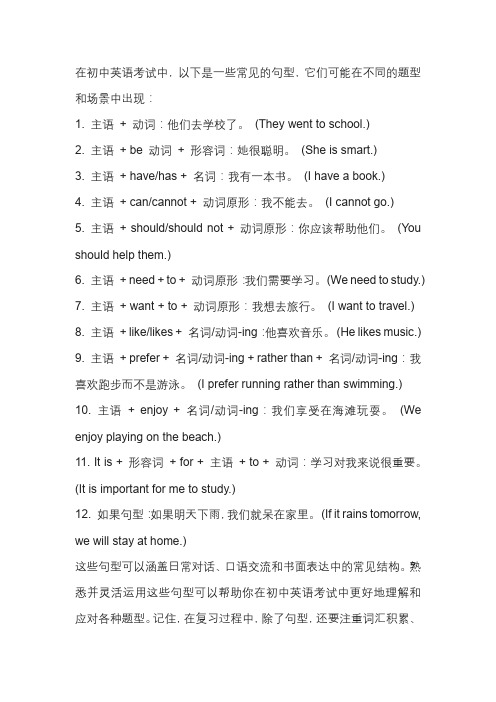
在初中英语考试中,以下是一些常见的句型,它们可能在不同的题型和场景中出现:1. 主语+ 动词:他们去学校了。
(They went to school.)2. 主语+ be 动词+ 形容词:她很聪明。
(She is smart.)3. 主语+ have/has + 名词:我有一本书。
(I have a book.)4. 主语+ can/cannot + 动词原形:我不能去。
(I cannot go.)5. 主语+ should/should not + 动词原形:你应该帮助他们。
(You should help them.)6. 主语+ need + to + 动词原形:我们需要学习。
(We need to study.)7. 主语+ want + to + 动词原形:我想去旅行。
(I want to travel.)8. 主语+ like/likes + 名词/动词-ing:他喜欢音乐。
(He likes music.)9. 主语+ prefer + 名词/动词-ing + rather than + 名词/动词-ing:我喜欢跑步而不是游泳。
(I prefer running rather than swimming.) 10. 主语+ enjoy + 名词/动词-ing:我们享受在海滩玩耍。
(We enjoy playing on the beach.)11. It is + 形容词+ for + 主语+ to + 动词:学习对我来说很重要。
(It is important for me to study.)12. 如果句型:如果明天下雨,我们就呆在家里。
(If it rains tomorrow, we will stay at home.)这些句型可以涵盖日常对话、口语交流和书面表达中的常见结构。
熟悉并灵活运用这些句型可以帮助你在初中英语考试中更好地理解和应对各种题型。
记住,在复习过程中,除了句型,还要注重词汇积累、语法规则和阅读理解能力的提升。
七年级英语所有重点句型公式
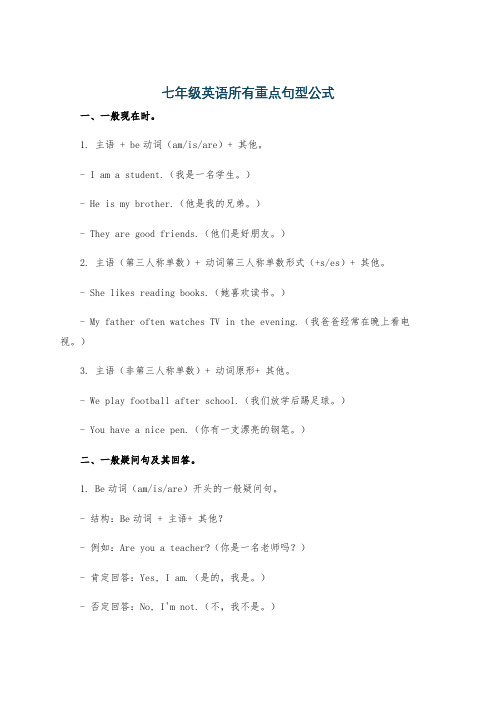
七年级英语所有重点句型公式一、一般现在时。
1. 主语 + be动词(am/is/are)+ 其他。
- I am a student.(我是一名学生。
)- He is my brother.(他是我的兄弟。
)- They are good friends.(他们是好朋友。
)2. 主语(第三人称单数)+ 动词第三人称单数形式(+s/es)+ 其他。
- She likes reading books.(她喜欢读书。
)- My father often watches TV in the evening.(我爸爸经常在晚上看电视。
)3. 主语(非第三人称单数)+ 动词原形+ 其他。
- We play football after school.(我们放学后踢足球。
)- You have a nice pen.(你有一支漂亮的钢笔。
)二、一般疑问句及其回答。
1. Be动词(am/is/are)开头的一般疑问句。
- 结构:Be动词 + 主语+ 其他?- 例如:Are you a teacher?(你是一名老师吗?)- 肯定回答:Yes, I am.(是的,我是。
)- 否定回答:No, I'm not.(不,我不是。
)- Is he at home?(他在家吗?)- 肯定回答:Yes, he is.(是的,他在。
)- 否定回答:No, he isn't.(不,他不在。
)2. 助动词(do/does)开头的一般疑问句(用于行为动词的一般现在时)- 结构:Do/Does+主语+动词原形+其他?- 例如:Do you like music?(你喜欢音乐吗?)- 肯定回答:Yes, I do.(是的,我喜欢。
)- 否定回答:No, I don't.(不,我不喜欢。
)- Does she go to school by bike?(她骑自行车去上学吗?)- 肯定回答:Yes, she does.(是的,她是。
初中英语句型结构大全

初中英语句型结构大全一、名词句型1. 主语 + 系动词 + 表语- My brother is a teacher.- The movie was interesting.2. 主语 + 动词 + 名词- They bought a new car.- I cook dinner every day.3. 主语 + 动词 + 名词 + 介词短语- She plays the guitar in her free time.- We visited the museum on Saturday.4. 主语 + 动词 + 双宾语- He gave me a present.- They showed us their new house.5. 主语 + 动词 + 宾语 + 宾语补足语- We elected him class monitor.- She made her mother proud.6. 主语 + 动词 + 不定式- I want to learn how to swim.- He needs to finish his homework.7. 主语 + 动词 + 动名词- They enjoy swimming in the lake.- She loves reading books.8. 主语 + 动词 + 不定式/动名词 + 宾语- I heard him sing a song.- I watched her play basketball.9. there be 句型- There is a cat on the tree.- There are some apples in the basket.二、形容词句型1. 主语 + be + 形容词- She is beautiful.- It is cold today.2. 主语 + be + 名词 + 形容词- He is a hardworking student.- They are happy children.3. 主语 + be + 形容词 + 不定式/动名词- The book is interesting to read. - The movie is exciting to watch.4. 主语 + 动词 + 形容词- I find the story very interesting. - We consider it important to study.5. 主语 + 动词 + 名词 + 形容词- They made me feel proud of myself. - She found the movie boring.6. 主语 + 动词 + 形容词 + 宾语- We keep our classroom clean.- He made his sister happy.三、副词句型1. 主语 + 动词 + 副词- He runs fast.- She speaks English fluently.2. 主语 + be + 副词- The weather is really nice.- The food smells delicious.3. 主语 + 动词 + 形容词 + 副词- They sing beautifully.- He plays tennis well.4. 主语 + 动词 + 副词 + 宾语- I eat breakfast early in the morning.- They finished their work quickly.四、介词句型1. 动词 + 介词 + 宾语- She looks at herself in the mirror.- He listens to music every evening.2. 形容词/副词 + 介词 + 宾语- She is afraid of spiders.- The cat jumps onto the table.3. 名词/代词 + 介词 + 名词/代词- I gave the book to him.- She borrowed a pen from me.五、连接词句型1. 并列连词- She is smart and beautiful.- He likes playing basketball but hates swimming.2. 结果连词- She studied hard, so she passed the exam.- He didn't study, therefore he failed the test.3. 条件连词- If it rains tomorrow, we will stay indoors.- Unless you finish your homework, you can't play video games.4. 原因连词- He is tired because he stayed up late last night.- We missed the bus as we woke up late.5. 转折连词- He is nice, but sometimes he can be mean.- I love ice cream; however, I am lactose intolerant.6. 让步连词- Although it was raining, they went hiking.- Despite feeling tired, she continued to work.六、从句句型1. 名词性从句- What she said is true.- Whether he will come or not is uncertain.2. 定语从句- The book that she lent me is very interesting.- The girl who won the race is my friend.3. 状语从句- I will go to the party if I have time.- She cried because she failed the test.以上是初中英语常用的句型结构,包括名词句型、形容词句型、副词句型、介词句型、连接词句型和从句句型。
初中英语早读材料 60个中考必备句型
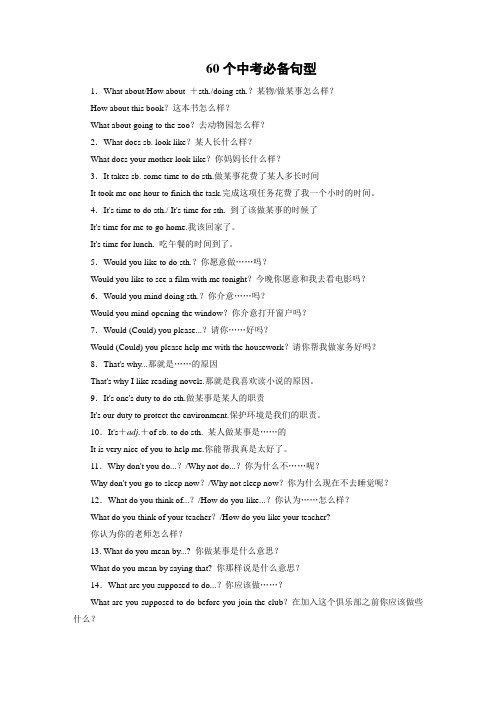
60个中考必备句型1.What about/How about +sth./doing sth.?某物/做某事怎么样?How about this book?这本书怎么样?What about going to the zoo?去动物园怎么样?2.What does sb. look like?某人长什么样?What does your mother look like?你妈妈长什么样?3.It takes sb. some time to do sth.做某事花费了某人多长时间It took me one hour to finish the task.完成这项任务花费了我一个小时的时间。
4.It's time to do sth./ It's time for sth. 到了该做某事的时候了It's time for me to go home.我该回家了。
It's time for lunch. 吃午餐的时间到了。
5.Would you like to do sth.?你愿意做……吗?Would you like to see a film with me tonight?今晚你愿意和我去看电影吗?6.Would you mind doing sth.?你介意……吗?Would you mind opening the window?你介意打开窗户吗?7.Would (Could) you please...?请你……好吗?Would (Could) you please help me with the housework?请你帮我做家务好吗?8.That's why...那就是……的原因That's why I like reading novels.那就是我喜欢读小说的原因。
9.It's one's duty to do sth.做某事是某人的职责It's our duty to protect the environment.保护环境是我们的职责。
初中英语重点句型归纳

初中英语重点句型归纳一、陈述句型1. 主语 + be动词 + 表语例句:I am a student.2. 主语 + 动词 + 宾语例句:Tom likes playing basketball.3. 主语 + 动词 + 间接宾语 + 直接宾语例句:My mother bought me a new book.4. 主语 + 动词 + 宾语 + 宾语补足语例句:We elected him monitor.5. 主语 + 动词 + 宾语 + 宾语补足语 + 宾语补足语例句:They made him chairman.6. 主语 + do/does + not + 动词原形例句:She does not like swimming.7. Do/Does + 主语 + 动词原形例句:Do you like English?8. 主语 + have/has + 过去分词例句:He has finished his homework.9. 主语 + have/has + not + 过去分词例句:They haven't seen the film yet.10. Have/Has + 主语 + 过去分词例句:Have you ever visited Beijing?11. There be句型例句:There is a book on the desk.12. It be + adj. + 不定式例句:It is important to learn English well.13. It is + adj. + for + 人 + to + 不定式例句:It is difficult for me to solve the math problem.二、疑问句型1. Yes/No问句:句型为:Do/Does + 主语 + 动词原形?例句:Do you like English?2. 特殊疑问句:以特殊疑问词(what, where, when, why, who, how等)开头。
初中英语60个十分重要的句型

与期中考试英语满分的距离,是这60个重要的句型!之邯郸勺丸创作初中60个重要的句型,希望对大家有帮忙!1.as…as和……一样中间必须用形容词或副词原级.例如:Thisclassroom is as big as that one.这间教室和那间一样大.Heruns as fast as Tom.他和汤姆跑的一样快.否认结构:not as/so…as,“不如……”.上面的两个句子可辨别改成:Thisclassroom is not as/so large as that one.这间教室不如那间大.Hedoesn’t run as/so fast as Tom.他跑得不如汤姆快.2.as soon as一……就……用来引导时间状语从句.若主句是一般将来时,从句要用一般现在时.例如:I’lltell him the plan as soon as I see him.我一看到他就告知他这个计划.He’llgo home as soon as he finishes his work.他一完成任务就回家.3.be busy/enjoy/hate/go on/finish doing sth.忙于/喜欢/讨厌/继续/完成做某事在enjoy,finish,hate,go on,be busy等词语后,一般用动词-ing形式作宾语.例如:LinTao is busy making a model plane.林涛正忙着做飞机模型.Mymother enjoys taking a walk after supper.我妈妈喜欢晚饭后散步.I hatewatching Channel Five.我讨厌看五频道.Whensomeone asked him to have a rest,he just went onworking.当有人让他休息一会儿时,他仍继续任务.I havefinished writing the story.我已经写完了故事.4.fill…with用……装满......;be filled with 充满了……;be full of充满了......①be filled with说明由外界事物造成的此种状态,暗示主动.例如:Thebox is filled with food.盒子里装满了食物.②be full of说明主语处于的状态.此外,还可暗示程度,意为“很是”.例如:Thepatient’s room is full of flowers.那个病人的房间摆满了花.Theyoung man is full of pride.那个年轻人很是骄傲.③这两种结构还可以相互改写.例如:I fillthe box with food.The box is full of food.5.be good/bad for有利于/有害于……此句型是:be+adj.+for+n.结构.例如:Doingmorning exercises is good for your health.做早操对你的健康有益.Alwaysplaying computer games is bad for your study.总玩电脑游戏对你的学习晦气.6.be used to(doing)sth.习惯于……后必须接名词或动名词,可用于现在、过去、将来的多种时态.be可用get,become来代替.例如:He isused to life in the country.(He is used to living inthe country.)他习惯于乡村生活.Hewill get used to getting up early.他将会习惯于早起.注意:be used to do的意思是“被用来做……”.例如:Woodis used to make paper.木材被用来造纸.7.both…and…两者都……用来连接两个并列成分;当连接两个并列主语时,其后谓语动词用单数.例如:Boththe students and the teachers will go to the HistoryMuseumtomorrow.不管老师还是学生明天都会去历史博物馆.8.can’t help doing sth.禁不住做某事help在此的意思是“抑制,忍住”,其后接动词-ing形式.例如:Hisjoke is too funny.We can’t help laughing.他的笑话太有趣了,我们禁不止笑了起来.9.sth.costs sb.some money某物花费某人多少钱此句型的主语是物.cost一词带的是双宾语,它的过去式、过去分词和原型一样.Thisbook cost me five yuan.这本书花了我五元钱.10.either…or…不是……就是……,或者……或者……用来连接两个并列成分,当连接并列主语时,谓语动词与邻近的主语坚持一致.Youmay either stay here or go home.你可以呆在这儿,也可以回家.Eithershe or I am right.=Either I or she is right.不是她对就是我对.11.enough(for sb.)to do sth.足够……做……在此结构中,for用来引出不定式的逻辑主语.例如:Theice isn’t thick enough for you to walk on.这冰还没有厚到你可以在上面走的程度.12.feel like doing sth.想要做……此处like 为介词,后面跟动词-ing形式.此句型与would like to dosth.同义.例如:I feellike drinking a cup of milk.我想喝一杯牛奶.13.feel/find/think it adj./n.to do sth.认为某事……在此结构中it为形式宾语,不定式短语作真正的宾语.例如:I findit very interesting to play football.我发明踢足球很有趣.Shethinks it her duty to help us.她认为帮忙我们是她的职责.14.get ready for sth./to do sth.Getready for sth.意为“为某事做准备”;getready to dosth.意为“准备做某事”例如:We aregetting ready for the meeting.我们正在为会议做准备.Theywere getting ready to have a sports meet at that moment.他们那时正准备开运动会.15.get/receive/have a letter from收到……的来信,相当于hear fromDidyou receive a letter from John?你收到约翰的来信了吗?I gota letter from my brother yesterday.我昨天收到了我弟弟的一封来信.16.hadbetter(not)do sth.最好(别)做某事hadbetter为情态动词,其后需用动词原形.had better经常使用缩写,酿成’d better,其否认形式是在其后直接加not.例如:We hadbetter go no w.=We’d better go now.我们最好现在走吧.You’dbetter not go out because it is windy.今天起风,你最好别出去了.17.havesth.done使(某事)完成(动作由他人完成)sth.为宾语,done为过去分词作补语.例如:We hadthe machine repaired.我们请人把机器修好了.注意区分:We haverepaired the machine.我们(自己)已经修好了机器.18.help sb.(to)do sth./with sth.帮忙某人(做)某事,其中的to可以省略.例如:Ioften help my mother with housework.我经常帮忙妈妈做家务.Wouldyou please help me(to)look up these words?请你帮忙我查查这些词好吗?19.How do you like……?你认为……怎么样?与what do you think of…?同义.例如:How doyou like the weather in Beijing?你认为北京的天气怎么样?你觉得这部新电影如何?20.I don’t think/believethat…我认我/相信……不……其中的not是对宾语从句进行否认而不是对主句否认(否认前移).that可省略.例如:Idon’t think it will rain.我认为天不会下雨.Idon’t believe the girl will come.我相信那女孩不会来了.21.It happens that…碰巧……相当于happen to do例如:Ithappened that I heard their secret.可改写为:I happened tohear their secret.我碰巧听到了他们的秘密.22.It’s/has been+一段时间+since从句自从某时起做某件事情已经一段时间了该句型中since引导的时间状语从句经常使用一般过去时.例如:It’s twentyyears since he came here.他来这里已经20年了.It hasbeen six years since he married Mary.他和玛丽结婚已经六年了.23.It is+adj./n.+for sb.to do sth.做某事对某人来说……It是形式主语,真正的主语是不定式todo sth.例如:It’snot easy for us to study English well.对我们来说学好英语其实不容易.It’s agood idea for us to travel to the south.去南方旅行对我们来说是个好主意.24.It’s+adj.+of sb.to do sth.It是形式主语,to dosth.是真正的主语,当表语(即形容词)能对逻辑主语描述时,经常使用介词of,而不必for.例如:It’svery polit e of you to give your seat to old people.你给老人让座,很是有礼貌.25.Itseems/appears(to sb)that…(在某人看来)好像……此句中的it是主语,that引导的是表语从句.例如:Itseems that he islying.看样子他好像是在撒谎.Itappears to me that he never smiles.在我看来,他从来没有笑过.26.It is+数词+metres/kilometerslong/wide………是多少米(千米)长(宽)用来暗示物体的长(宽,高),如数词大于一,名词要用单数.例如:Itis20 metres long from this end to that end.从这端到那端有二十米长.27.It’s time for sb.to do sth.是某人干某事的时候了it是形式主语,真正的主语是动词不定式to do sth.例如:It’stime for the child to go to bed.孩子该睡觉了.比较下面两种结构:①It’s time for+n.例如:It’stime forschoo l.②It’s time to dosth.例如:It’stime to go to school.28.It takes sb.some time to do sth.花费某人多少时间做某事it是形式主语,真正的主语是动词不定式to do sth.例如:Ittakes her fifteen minutes to walk to the bus stop fromhere.从这儿走着到公交车站将花费她15分钟.Ittook the old man three days to finish the work.那个老人花了三天时间完成这项任务.29.keep(on)doing sth.一直坚持做某事keepdoing sth.一般用于静态动词.keep on doingsth.意为“继续不断地做某事”,一般用于动态动词,但两者的区别其实不是很严格,有时可以互换.例如:Don’tkeep on doing such foolish things.不要再做这样的傻事了.Hekept sitting there all day.他整天坐在那里.30.keep…from doing sth.阻止......做某事相当于stop…from doingsth.,prevent…from doing sth.在主动句中,stop和prevent后面的from可以省略,但在主动结构中,from 不成以省略.例如:Pleasekeep the children from swimming in the sea.请别让孩子到海里游泳.Thebig noise outside my room stopped me from doing myhomework.屋外巨大的噪音使我不克不及做作业.31.keep sb.doing sth.让某人一直做某事不成和keep sb.fromdoing sth.结构混淆.例如:Why doyou keep me waiting for a long time?你为什么让我等了很长时间?32.make sb.do sth.使某人干某事make意为“使”时,其后要有不带to的动词不定式.例如:Hemade me work ten hours a day.他让我每天任务10小时.注意:上句如改成主动语态,则work前的to不克不及省略.例如:I wasmade to work ten hours a day.33.neither…nor…既不……也不……当连接两个并列主语时,谓语动词与邻近的主语取得一致(就进一致原则).例如:Neitherwe nor Jack knows him.我们和杰克都不认识他.Heneither knows nor cares what happened.他对产生的事情不理不睬.34.not…until…直到……才......until后可跟名词或从句,暗示时间.例如:Hedidn’t come until late in the evening.他直到晚上很迟才来.Hedidn’t arrive until the game began.直到角逐开始他才来.35.sb.pays money for sth.某人花钱买某物此句型主语是人.例如:I’vealready paid 2,000 yuan for the motor bike.我已经花了2000元买这辆摩托车.36.spend time/money on sth./(in)doing sth.花费(时间、钱)在某事上/做某事其中in可以省略,通常主语为“人”.例如:Ispent five yuan on this book.我在这本书上花了五元钱.Ispent two hours(in)doing my homework yesterday.昨晚我花了两个小时做作业.37.so…that…太……以至于……用于复合句,that引导的是结果状语从句.so是副词,后面应接形容词或副词,如果接名词,应用such.例如:Theice is so thin that you can’t walk on it.冰太薄了,你不克不及在上面走.He issuch a kind man that we all like him.他是一个很是好的人,我们都很喜欢他.38.stop to do sth.,stop doing sth.Stopto do sth.意为“停下来去做另一件事”,stopdoing sth.意为“停止正在做的事”例如:You’retoo tired.You’d better stop to have a rest.你们太累了,最好停下来休息一会儿.Theteacher is coming.Let’s stop talking.老师来了,咱们别说话了.39.Thank you for doing sth.感谢你做了……for之后除了加动名词doing外,还可以加名词.例如:Thankyou for giving me the present.谢谢你给我的礼物.Thankyou for your help.=Thank you for helping me.谢谢你的帮忙.40.thanks to多亏……,由于……thanks后的s不克不及省略,to是介词.例如:Thanksto my friend Jim,I’ve worked out thisproblem.多亏了我朋友吉姆的帮忙,我已经解决了这个问题.41.There be句型①在此结构中,there是引导词,在句中不克不及充当任何成分,也不必翻译出来.句中的主语是某人或某物,谓语动词be要与主语的数坚持一致.例如:Thereis a man at the door.门口有一团体.当主语是由两个或者两者以上的名词充当时,谓语动词be要跟它邻近的那个名词的数一致(就近一致).例如:Thereare two dogs and a cat under the table.桌下有两只狗和一只猫.比较:There is a catand two dogs under thetable.②T here be句型中的be不克不及用have来代替,但可以用lie(位于,躺),stand(矗立),exist(生存),live(生活)等词来替换.例如:Therestand a lot of tall buildings on both sides of thestreet.街道两旁矗立着许多高楼.Therelies lake in front of our school.我们学校前面有一个湖.Oncethere lived a king here.这儿曾有一个国王.Thereis going to be a sports meeting next week.下周准备开一个运动会.Therebe的拓展结构:thereseem(s)/happen(s)to be…Thereseems to be one mistake in spelling.似乎有一处拼写错误.Therehappened to be a ruler here.这儿碰巧有把尺子.Thereseemed to be a lot of people there.那儿似乎有很多人.42.The+adj.比较级,the+adj.比较级越……,越……此句型暗示一方随另一方的变更而变更.例如:Theharder he works,the happier he feels.他任务越努力,就感应越幸福.Themore,the better.多多益善.43.too+adj./adv.+to do sth.太……以至于不克不及…….此句型为简单句,后面的to暗示否认含义.例如:Theice is too thin for you to walk on.这冰太薄,你不克不及在上面走.Thebag is too heavy to carry.这个袋子太重搬不动ed to do sth.过去经常做某事usedto是情态动词,暗示过去的习惯动作或状态,现在已不存在,因此只用于过去时态.例如:Heused to get up early.他过去总早起.When Iwas young,I used to play tennis very often.我年轻时经常打网球.否认形式有两种:didn’t useto;used not to,例如:Hedidn’t use to come.=He usedn’t to come.他过去不常来.45.what about…?……怎么样?后面可接名词、代词、动名词等.与“how about…?”同义.例如:Wehave been to Hainan.What about you?我们去过海南,你呢?Whatabout going to the park on Sunday?星期天去公园怎么样?46.What day/date is it today?今天星期几(几月几日)?—Whatday is it today?—Sunday.—Whatdate is it today?—June24th.47.What’s wrong(the matter)with…?……怎么了?What’swrong with you,Madam?夫人,您怎么了?Youlook worried.What’s wrong with you?你看上去很焦急,出什么事了?48.Why not do…?为什么不做……?谓语动词用原形.与Why don’t youdo…?同义.例如:Whynot go to see the film with us?=Why don’t you go tosee the film withus?为什么和睦我们一起去看电影呢?49.would like to do sth.想做……后用动词不定式作宾语.例如:Iwould like to drink a cup of tea.我想喝一杯茶.疑问句式:Would you like(to drink)a cup of tea?你想喝杯茶吗?50.adj./adv.比较级+and adj./adv.比较级越来越......若形容词/副词为双音节词及多音节词,则这一结构变成“more and more+形容词/副词”.例如:It’sgetting warmer and warmer.天气变得越来越暖和了.Thelittle girl becomes more andmore beautiful.小女孩变得越来越漂亮了.51.adj.比较级+thanthan引导的是典型的比较级句型,暗示“一者比另一者……”,其前用形容词或副词的比较级,than从句可以用省略形式.例如:I knowyou better than she does.我比她更了解你.Thishouse is bigger than that one.这所屋子比那所屋子大.52.though-从句though引导的是让步状语从句,意思是“虽然……但是……”.但不克不及和but连用,英语中表达“虽然……,但是……”时,though和but只能用一个.例如:Thoughit was snowing,it was not very cold.虽然下着雪,可其实不太冷.I waslate for the last bus though I hurried.虽然我拼命赶路,还是没搭上最后一班公交车.Wedidn’t feel tired though we walked a long way.虽然我们走了很长的路程,但是并没有感应累.53.if-从句If引导的是条件状语从句,“如果;假如“.如主句用一般将来时,if从句要用一般现在时(主将从现).例如:If Igo to the Great Wall tomorrow,would you like to comealong?如果明天我去长城,你会和我一起去吗?If itrains tomorrow,I won’t go.如果明天下雨,我就不去了.54.because-从句引导原因状语从句,“因为”.例如:Hedidn’t hear the knocking at the door because he waslistening to theradio.他没有听见敲门声,因为他正在听收音机.55.so+do/be+主语“So+be/助动词/情态动词+主语”暗示前面所述内容也适用于另一人或物.be、助动词或情态动词的选择视前面陈述句中谓语动词的时态形式而定.例如:Helikesfootball and so do I.他喜欢足球,我也如此.Jimwas playing football just now and so was Tom.方才吉姆在踢足球,汤姆也在踢足球.比较:“So+主语+be/助动词/情态动词.”结构,是用来证实前一句所表达的内容(起强调作用).be、助动词或情态动词的选择视前面陈述句中谓语动词的时态形式而定.A:Itis very hot today.今天天气很热.B:Soit is.确实如此.56.not only…but also…不单……并且……经常使用来连接语法作用相同的词、短语或句子.连接两个主语时,谓语动词要和紧靠它的主语在人称和数上坚持一致.例如:Shelikes not only singing but also dancing.她不单喜欢唱歌,并且喜欢跳舞.He isnot only a good doctor but also a good father.他不单是个好医生并且是个好爸爸.Notonly I but also he is hoping to go there.不单我并且他也想去那儿.57.prefer…to…喜欢……胜过…...prefer(doing)sth.to(doing)sth.意为“两者相比更喜欢(做)其中之一”.在此结构中,to是介词,接名词或动名词,结构中前后所跟成分一样.例如:Heprefers tea to coffee.茶与咖啡相比,他更喜欢茶.Heprefers doing shopping to going fishing.购物与钓鱼相比,他更喜欢购物.58.感慨句型:What(a/an)+adj.+n.+主语+谓语!How+adj./adv.++主语+谓语!What aclever boy(he is)!=How clever the boy is!这个男孩儿多聪明啊!What awonderful film we saw last night!昨天晚上我们看的电影多精彩啊!Howlovely the weather is!天气多好。
初中英语八大时态+60句必考句型

初中英语八大时态+60句必考句型一般现在时一、概念:经常、反复发生的动作或行为及现在的某种状况。
二、常搭配的时间状语:always, usually, often, sometimes, every week (day, year, month…), once a week, etc.三、基本结构①be动词(is,am,are);②行为动词(主语是第三人称单数时谓语动词要加s或es外)否定形式:①am/is/are+not;②此时态的谓语动词若为行为动词,则在其前加don't,如主语为第三人称单数,则用doesn't,同时还原行为动词。
一般疑问句:①把be动词放于句首;②用助动词do提问,如主语为第三人称单数,则用does,同时,还原行为动词。
例句:I go to school at 6 every morning. 每天早上我七点去上学。
Summer follows spring. 春天之后是夏天。
四、基本用法:1) 描述当前时间内经常出现、反复发生的动作或存在的状态。
在这种情景中,句子常带有表示频率的时间状语:always , everyday , often , once a week (month , year , etc.) , sometimes , seldom , usually等等,以表示句中的动作或状态是习惯性的、经常性的。
例如:They raise ducks as a sideline .他们以养鸭为副业。
2)仅为了描述状态、性质、特征、能力等等。
这里的目的是为了"描述现阶段的动作或状态",其重点"不是强调动作发生的时间、或进行的状态"。
例如:He can speak five foreign languages .他能说五种外语。
That is a beautiful city .那是座美丽的城市。
3) 陈述客观事实、客观真理。
七年级英语句型归纳
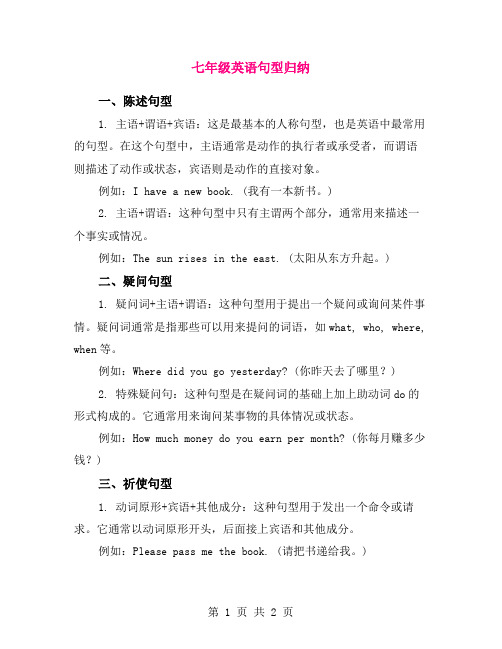
七年级英语句型归纳一、陈述句型1. 主语+谓语+宾语:这是最基本的人称句型,也是英语中最常用的句型。
在这个句型中,主语通常是动作的执行者或承受者,而谓语则描述了动作或状态,宾语则是动作的直接对象。
例如:I have a new book. (我有一本新书。
)2. 主语+谓语:这种句型中只有主谓两个部分,通常用来描述一个事实或情况。
例如:The sun rises in the east. (太阳从东方升起。
)二、疑问句型1. 疑问词+主语+谓语:这种句型用于提出一个疑问或询问某件事情。
疑问词通常是指那些可以用来提问的词语,如what, who, where, when等。
例如:Where did you go yesterday? (你昨天去了哪里?)2. 特殊疑问句:这种句型是在疑问词的基础上加上助动词do的形式构成的。
它通常用来询问某事物的具体情况或状态。
例如:How much money do you earn per month? (你每月赚多少钱?)三、祈使句型1. 动词原形+宾语+其他成分:这种句型用于发出一个命令或请求。
它通常以动词原形开头,后面接上宾语和其他成分。
例如:Please pass me the book. (请把书递给我。
)2. Let祈使句:这种句型通常使用let这个动词来构成祈使句。
它通常用于建议或邀请某人做某事。
例如:Let's go for a walk. (我们一起去散步吧。
)四、感叹句型这种句型用于表达强烈的情感或感叹。
它通常由what或how引导,后面跟主语和谓语。
例如:What a beautiful day it is! (多么美好的一天啊!) / How fast he runs! (他跑得多快啊!)五、there be句型这个句型用于描述存在的情况或描述周围环境。
它通常用来表示某地有某物或某人。
例如:There is a book on the table. (桌子上有本书。
七年级英语句型
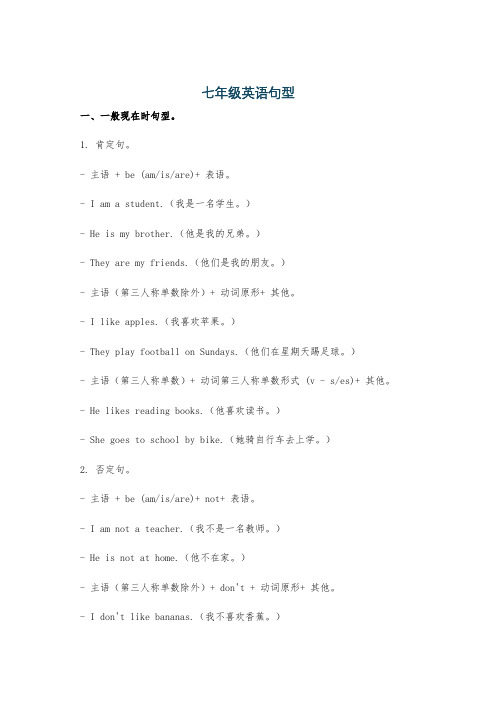
七年级英语句型一、一般现在时句型。
1. 肯定句。
- 主语 + be (am/is/are)+ 表语。
- I am a student.(我是一名学生。
)- He is my brother.(他是我的兄弟。
)- They are my friends.(他们是我的朋友。
)- 主语(第三人称单数除外)+ 动词原形+ 其他。
- I like apples.(我喜欢苹果。
)- They play football on Sundays.(他们在星期天踢足球。
)- 主语(第三人称单数)+ 动词第三人称单数形式 (v - s/es)+ 其他。
- He likes reading books.(他喜欢读书。
)- She goes to school by bike.(她骑自行车去上学。
)2. 否定句。
- 主语 + be (am/is/are)+ not+ 表语。
- I am not a teacher.(我不是一名教师。
)- He is not at home.(他不在家。
)- 主语(第三人称单数除外)+ don't + 动词原形+ 其他。
- I don't like bananas.(我不喜欢香蕉。
)- They don't play basketball.(他们不打篮球。
)- 主语(第三人称单数)+ doesn't+ 动词原形+ 其他。
- He doesn't watch TV in the morning.(他早上不看电视。
)3. 一般疑问句。
- Be (am/is/are)+ 主语+ 表语?- Are you a doctor?(你是一名医生吗?)- Is he your father?(他是你的父亲吗?)- (第三人称单数除外)Do + 主语+ 动词原形+ 其他?- Do you like music?(你喜欢音乐吗?)- Do they go to school on foot?(他们步行去上学吗?)- (第三人称单数)Does+ 主语+ 动词原形+ 其他?- Does she like dancing?(她喜欢跳舞吗?)二、一般过去时句型。
初中英语所有句型

初中英语所有句型
1.肯定句
-主语+动词+宾语
- 主语 + be动词 + 表语
- 主语 + be动词 + 状语
- There be句型:There + be动词 + 宾语
2.否定句
- 主语 + do/does/did + not + 动词原形
- 主语 + be动词 + not + 表语/状语
3.疑问句
-动词/助动词+主语+其他?
4.选择疑问句
- 动词/助动词 + or + 动词/助动词 + 主语 + 其他?
5.特殊疑问句
-特殊疑问词+助动词/助动词+主语+其他?
6.句型倒装
-否定词/副词/状语/介词置于句首时,主语与谓语动词倒装7.祈使句
-动词原形+宾语(若有)
8.感叹句
- How + 形容词/副词 + 主语 + 谓语动词!
9.简单句
-只含有一个主语和一个谓语动词的句子
10.并列句
- 句子与句子之间通过连词(and, but, or, so等)连接
11.复合句
-包含主句和从句的句子
12.定语从句
-用来修饰名词的从句
13.状语从句
-用来修饰动词、形容词或副词的从句
14.宾语从句
-作为宾语的从句
15.主语从句
-作为主语的从句
以上是初中英语常见的句型,可以根据具体语境和需求进行组合和变化。
初中英语语法句型

初中英语语法句型一、基本句型1. 主语 + 谓语- She walks to school every day.- They play basketball in the park.2. 主语 + 谓语 + 宾语- He likes playing the piano.- We buy fruits at the supermarket.3. 主语 + 谓语 + 宾语 + 宾语补足语- We elected him monitor of our class.- They painted their house white.4. 主语 + 谓语 + 宾语 + 宾语补足语 + 定语- My father made me a beautiful toy.- The teacher found the book very interesting.5. 主语 + 系动词 + 表语- She is a kind girl.- The weather has become colder.6. 主语 + 系动词 + 表语 + 定语- The movie was very exciting.- His room is always tidy and clean.7. There be 句型- There is a big tree in front of our school.- There are many books on the shelf.8. 主语 + 不及物动词- The bird flies in the sky.- The children laughed happily.二、特殊句型- Open the window, please.- Don't forget to turn off the lights.2. 虚拟语气句型- If it were sunny, we would go hiking.- I wish I could speak fluent English.3. If 引导的条件状语从句- If it rains tomorrow, we won't go to the park.- If you study hard, you will pass the exam.4. When/While 引导的时间状语从句- We watched a movie while we were waiting for the bus.- I woke up when the alarm clock rang.5. 不定式作目的状语- We study hard to get good grades.- She practices playing the piano every day to improveher skills.6. 以动名词作主语- Swimming is my favorite sport.- Reading books is a good way to gain knowledge.7. 以动词不定式作宾语- I want to be a doctor when I grow up.- They decided to go on a trip during the summer vacation.8. 以名词或代词作宾语补足语- I find English easy to learn.- They made him the captain of the team.三、句型转换1. 主动语态变被动语态- The students are cleaning the classroom.(主动)The classroom is being cleaned by the students.(被动)2. 被动语态变主动语态- The book was written by Mark Twain.(被动)Mark Twain wrote the book.(主动)3. 直接引语变间接引语- He said, "I will come tomorrow."(直接引语)He said that he would come the next day.(间接引语)4. 陈述句变疑问句- You are a student.(陈述句)Are you a student?(疑问句)5. 否定句变肯定句- She doesn't like apples.(否定句)She likes apples.(肯定句)这是初中英语语法句型的基本内容,希望对你的学习有所帮助。
- 1、下载文档前请自行甄别文档内容的完整性,平台不提供额外的编辑、内容补充、找答案等附加服务。
- 2、"仅部分预览"的文档,不可在线预览部分如存在完整性等问题,可反馈申请退款(可完整预览的文档不适用该条件!)。
- 3、如文档侵犯您的权益,请联系客服反馈,我们会尽快为您处理(人工客服工作时间:9:00-18:30)。
初中英语学习的60个必备句型蒜头英语初中英语学习,语法、词汇和短语都很重要,但有一项很容易被大家忽视,那就是句型的学习。
掌握一些核心、常用句型,对于英语学习和考试可以起到事半功倍的效果,尤其写作文的时候,就不会发愁句子该怎么写了!特别整理,初中英语学习的60个必备句型,及对应例句,供学习参考一一句型1 : There+be +主语+地点状语/时间状语There's a book on the desk.桌上有本书。
句型2 : What' s wrong with+sb. / sth. ?What's wrong with you?你怎么了?句型3 : How do you like...?How do you like Nanjing?你觉得南京怎么样?句型4 : What do you like about...?What do you like about Nanji ng?你喜欢南京什么?句型5 : had better(not)+动词原形You'd better have a rest.你最好休息一下。
句型6 : How+adj. / adv. + 主语+谓语!;What a/an+adj. + n. + 主语+ 谓语!How beautiful the girl is !这个姑娘真漂亮!What an interesting book it is!多有趣的一本书呀!句型7 : Thank+sb. +for (doing) sth.Tha nk you for help ing me.感谢你帮我。
句型8 : So+be/情态动词/助动词+主语He is a doctor. So am I.他是一个医生,我也是。
句型9 : ... not ... until ...He did n't do his homework un til his mother came back.直到他的父母回来他才写作业。
句型10:比较级+a nd+比较级It rained harder and harder.雨越下越大。
句型11 : the +比较级,the +比较级The more careful you are ,the fewer mistake you will make.越仔细,越少犯错。
句型12: ... as +adj./ adv.+as ... ; …not as/so+adj/adv. +as... Noting is as important as passion.没有什么跟激情一样重要。
Last Sun day the weather was not so hot as it is today.上个星期天的天气不如今天的天气炎热。
句型13: more/ less +adj.+than...I think art is more in teresti ng tha n music.我认为艺术比音乐更有趣。
句型14: stop sb/sth from doing sth.The Great Wall will stop the wind from blowing the earth away. 长城将阻挡风吹走土壤。
句型15: both ... and ...Both you and I are doctors.我和你都是医生。
句型16: either ... or...Either you or he is right .不是你对就是他对。
句型17 : neither ... nor ...Neither he nor I am a doctor.我和他都不是医生。
句型18: ... as soon as ...As soon as we were in side, the rain bega n to bucket dow n. 我们刚进屋,大雨便倾盆而下。
句型19: ... so+adj. / adv.+that ...I was so tired that I did n't want to have a supper.我累得连晚饭也不想吃了。
句型20: Though...+ 主句Though he is rich, his life is not happy.他虽然很有钱,但生活并不幸福。
句型21 : be going to do sthI am going to do my homework after go home.我回家将要做作业。
句型22 : be different fromThe weather in winter is different from that in spring.冬天的天气和春天不一样。
句型23: Welcome(back) to...Welcome back to school!欢迎回到学校!句型24: have fun doingYou will have fun reading about the world we live in.你会通过阅读了解我们生活中的世界。
句型25: ... because ... / ... ,so ...I don't buy it because it was too expensive.我没有买因为太贵了。
句型26: Why don t you do... = Why not do...Why don't you want to swim?你为什么不想学游泳?句型27 : make itNo matter how hard it is, I will make it one day.无论多难,总有一天我会成功的。
句型28: have nothing to doI don't care for the man who I have no ti ng to do with.我不关心那个与我无关的人。
句型29: be sure that... ;be sure of/ about sth.;be sure to do sth.I think so, but「m not sure.我想是这样,但我不敢确定。
I was not sure of / about the way ,so I asked some one.我对于怎么走没有把握,所以我问别人了。
句型30: between …and ...There is a supermarket betwee n the hospital and the school.在那家医院和那所学校之间有一家超级市场。
句型31 : keep sb. / sth. +adj/doing/ 介词短语/advYou must keep your room clea n.你们必须保持房间干净。
Sorry to have kept you wait ing.对不起,让你久等。
Can you keep her in the room ?你能让她在这个房里吗?Keep them there.让她们在那儿呆着。
句型32 : find +宾语+宾补He finds it very hard to travel around the big city .他发现要环游这个大城市是很难的。
句型33: ... not ... any more/ l on gerThe old man does n't travel any more.这位老人不再旅行了。
He isn't a thief any Ion ger.他不再是个贼。
句型34: What' s the weather like...?What's the weather like in spri ng in your hometow n ?你们家乡春天天气怎么样?句型35: There is no time to do sth ;sb have no time to do sth There was no time to think.没有时间思考。
I have no time to go home for lun ch.我没有时间回家吃午饭。
句型36: Help on eself to...Help yourself to some fish.吃鱼吧!句型37 : used to do sthI used to read this kind of story books.我过去常读这种故事书。
句型38: borrow ... from...I borrowed an En glish book from him.我从他那借了一本英语书。
句型39: lend sb. sth.= lend sth. to sb.He lent me a story book=He lent a story book to me. 他借我一本故事书。
句型40: have been to...Have you ever been to CHINA?你曾去过中国吗?句型41 : have gone to...Where's he?He's go ne to Chi na.他在哪儿?他去中国了。
句型42 : be famous for...Hawaii is famous for its beautiful beaches.夏威夷以它美丽的海滩而出名。
句型43: No matter +疑问句+主句No matter when you come , you are welcomed.无论你们什么时候来,都受欢迎。
句型44: be afraid of / to do / that...I'm afraid n ot.恐怕不能。
Don't be afraid of maki ng mistakes whe n speak ing En glish.当说英语时不要害怕犯错误。
句型45: ... as ... as possible ;... as ... as sb canI hope to see him as soon as possible.我希望能尽快见到他。
He ran here as fast as he could.他尽最大努力跑到这儿。
句型46: practise / enjoy / finish doingA young man practised speak ing En glish with Mr Brow n.一个年青人和布朗先生练习说英语。
Tom enjoys playing football very much.汤姆很喜欢踢足球。
